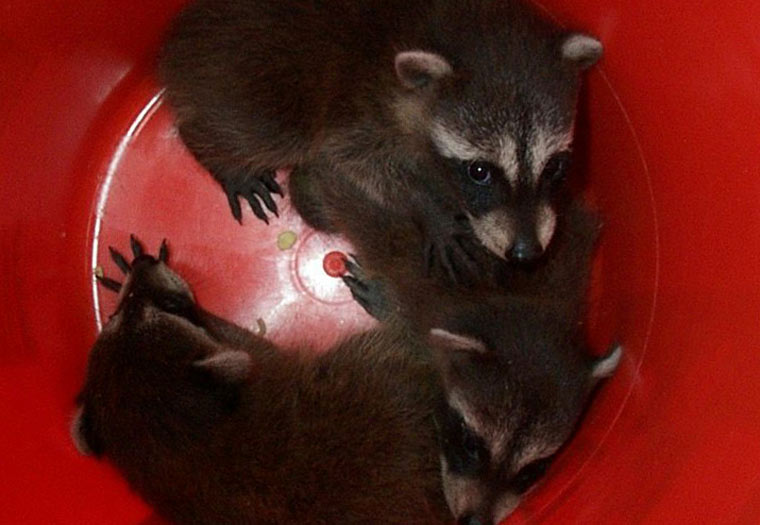- info@wildlife-removal.com
Call us for help in your town
Wildlife Removal Education
The Full Guide to Keeping Raccoons Out of Garbage Cans
Need raccoon removal in your hometown? We service over 500 USA locations! Click here to hire us in your town and check prices - updated for year 2020.
One of the biggest signs that you have raccoon hanging in your yard is the garbage can being knocked over the morning, the entire contents strewn messily all over your lawn and, sometimes, halfway down the street too.

It's a frustrating scenario, but it's also one that is becoming all too familiar, particularly with pest control experts and wildlife rehabilitators. In certain states across the United States, the subject of raccoon control can be a tricky one, especially when you start delving into all of the rules, laws, and regulations.
Why are raccoons in the garbage can?
There is one reason why you have raccoons in (and tearing through) your garbage cans and bags — FOOD. You throw your leftovers in the trash; they're prime pickings for a hungry passing wild scavenger, which the raccoon is. You throw out of date food in the trash too; they're also prime pickings for a hungry passing raccoon. Not just a raccoon; rats, foxes, coyotes, skunks, opossums, mice, and more are all responsible for garbage bag and can disasters. They're renowned for it. Read more about how to keep raccoons away.
How to stop raccoons getting into the garbage can
Of course, as with any wild critter invasion, the first thing that we would suggest you do is to remove all sources of food, but that's not easily done when you're talking about trash bags — usually filled with food. What you can do; however, is move the trash cans and bags. If you have bags on their own, move them into a can. A plastic one won't be strong or durable enough; most wild animals, including raccoons and rats, can chew and it won't be long until they've found their way in. It will need to be sturdy and long-lasting metal cans.
Once you've moved the bags into a can, make sure that the can has a lid and that the lid can be fastened securely. This could be with a coiled-around bicycle lock, rope or bungee cords keeping it in place, or even really heavy things piled on top. There are just a couple of things you'll need to remember — cords and ropes will need to be checked regularly as most nuisance wildlife will chew through the materials used with ease, and if the garbage can itself is quite light, the raccoon will push it over. With a bit of effort, a raccoons can be surprisingly strong. Even a full garbage can is somewhat easily knocked over when you're talking about a really determined character like this one.
You could try your hand at repellents — foods and other substances that are designed to either smell or taste bad and, therefore, put the raccoon (or other wild animal) off. In many cases, so-called repellents don't work. They can also attract other animals. Using one thing to repel raccoons might attract flies, bees, wasps, maggots, or maybe even other wildlife, including rats and mice. The only repellent that we can recommend for raccoons is wildlife eviction fluid — other smell therapies simply do not work, and any kind of food left down, whether it is meant to smell or taste bad or not, is going to attract other animals before long.
Finally, you may wish to take a good look at your property. Is it as well protected against wildlife as it should be? Do you have a fence erected around the perimeter? Is that a good enough fence to keep a stubborn and determined animal, such as the raccoon, out? Is that fence being inspected every now and again, perhaps requiring some TLC or repair work every now and again? Routine maintenance is often what alerts property owners to wildlife invasions and patches of damage, and the more regularly and stringently you keep your eyes opened to these things, the sooner you can catch any potential problems before they become very costly ones to put right.
Keeping raccoons out of your garbage cans and bags requires effort on your part — there is something attracting them closer and then keeping them close; you must work out what that is and remove it from the equation.
Go back to the Raccoon Removal page, or learn tips to do it yourself with my How to Get Rid of Raccoons guide or How to Get Raccoons Out of a Dumpster.


















